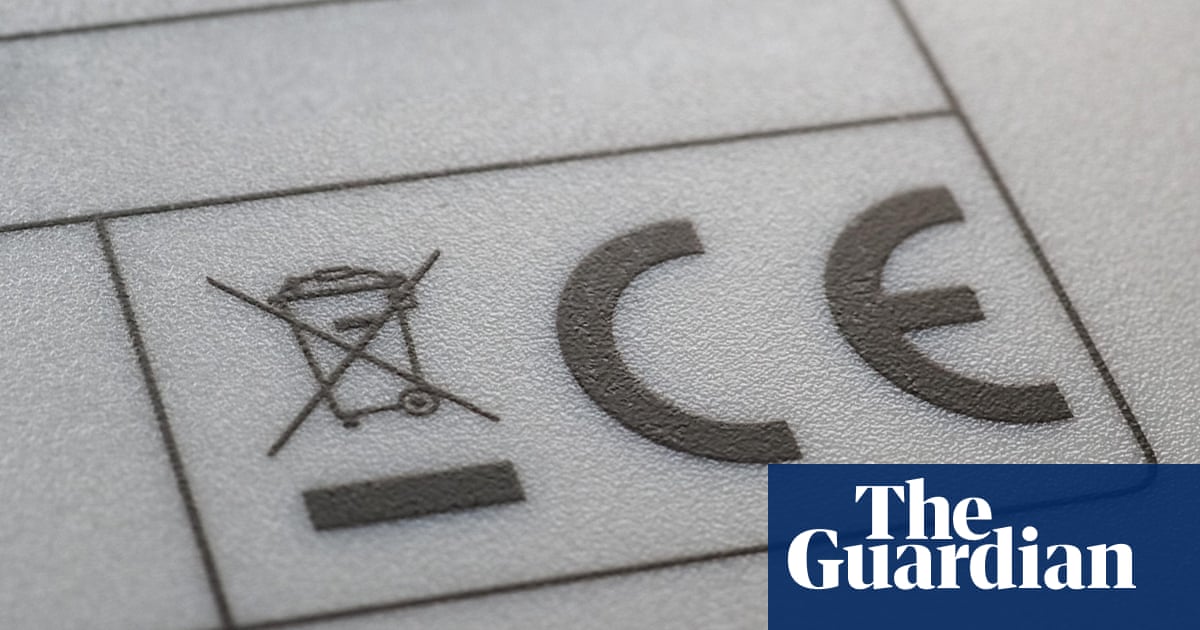
The UK will retain the EU’s product safety mark indefinitely, in the latest climbdown from proposed post-Brexit changes, after the government bowed to pressure from industry and manufacturers.
The CE (Conformité Européenne) mark is used by the bloc to certify that a wide range of items – from electrical goods and construction materials to medical devices and toys – meet safety standards.
The safety marking had been expected to be replaced by a new UKCA (UK Conformity Assessed) mark for goods sold in Great Britain from the end of 2024, after several extensions to the deadline for the changeover.
Businesses had called on the government to extend the use of the CE mark, saying that forcing them to meet new UK rules, which would initially duplicate EU product standards, would add significant costs at a time when many have been trying to get over the disruption caused by the pandemic and stubbornly high inflation.
The UKCA mark would not have been recognised in the EU, so would have been required only for goods to be sold in Great Britain.
Stephen Phipson, the chief executive of Make UK, the trade body representing manufacturers, said it had been lobbying the government to retain the CE mark. He called the indefinite delay “a pragmatic and commonsense decision that manufacturers will very much welcome and support”.
Phipson added: “This announcement will help safeguard the competitiveness of manufacturers and aid the UK as a destination for investment. It should bring more confidence about doing business in the UK and recognises the need to work with the reality of doing business.”
Smaller businesses had been particularly concerned about the cost of adapting to the new UKCA requirements.
Tina McKenzie, the policy chair of the Federation of Small Businesses, said the continued recognition of CE-marked products would “allow time for small firms to adjust to the UKCA marking system and focus on growing their business both at home and overseas”.
The Department for Business and Trade said it had made the decision after discussions with industry, and described it as a “key ask from businesses” that would “ease burdens and boost growth for the UK economy”.
Ministers said the move would give businesses certainty and would prevent a cliff-edge in December next year, when the UKCA mark was due to be introduced. Companies will also be able to choose whether to use either the UKCA or the CE mark when selling their products in Great Britain.
They had previously argued that the UKCA mark would allow the UK to control its goods regulations while maintaining high safety standards.
The business minister Kevin Hollinrake said: “By extending CE-marking use across the UK, firms can focus their time and money on creating jobs and growing the economy.”
The retention of the CE mark is the latest in a long line of announcements and postponements regarding post-Brexit rules. Members of the food industry are awaiting information from government about the introduction of post-Brexit import controls.
The final version of the UK’s new border strategy, known as the target operating model (TOM), is expected to be released shortly, after the government’s consultation with industry on its plans closed in late May.
The introduction of checks on goods arriving from overseas has been delayed several times over the past few years, and the government has changed its plans since they were first envisaged.
The image accompanying this article was changed on 1 August 2023 to one of a CE mark that adheres more closely to EU guidance on how it should be reproduced.












